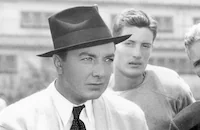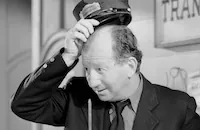Hold That Co-Ed
Brief Synopsis
Cast & Crew
George Marshall
John Barrymore
George Murphy
Marjorie Weaver
Joan Davis
Jack Haley
Film Details
Technical Specs

Synopsis
Rusty Stevens, former All-American quarterback for the prestigious midwestern Clayton University football team, returns to the school thinking that he has been hired as their coach. He discovers, however, that he has been signed to coach at State College, the run-down public institution in the same town. Upon learning that the team has only one football and no other equipment because Governor Gabby Harrigan, who is running for U.S. Senator, has cut their budget as a campaign stunt, Rusty leads a group of students to the state capitol to protest. The governor's refusal to meet with the students leads to a brawl with police. Advisors to Harrigan's opponent, the meek Republic candidate, Major Hubert Breckenridge, encourage him to take advantage of the incident and in a forthcoming speech to proclaim himself an advocate for education. However, to beat his opponent to the punch, Harrigan promises to increase expenditures to make State the greatest college in the country. When his secretary, Marjorie Blake, who has become attracted to Rusty, suggests that Harrigan could take advantage of the large crowds attracted to football games, Harrigan calls for a stadium to be built that will hold 100,000, to be called the "Gabby Bowl," and intimidates local businessmen to arrange for their illustrious alma maters to play there. At the stadium's groundbreaking, after Harrigan is hit in the head by a football kicked by Lizzie Olsen, the daughter of a famous football coach, he insists, for publicity purposes, that Lizzie be allowed to play on the team and thus become the game's first woman player. Lizzie kicks the tying point in State's first game against a good team, Louisiana, but to insure victory in their next game, Harrigan demands that the team gets seasoned players. Lizzie takes Harrigan's assistant, Wilbur Peters, to whom she has taken a fancy, to meet wrestlers Steve and Mike Wurgerski, former students who quit because they were broke, and during their match, Wilbur offers them phony government jobs paying $500 a month to play for State. With the Wurgerskis, State tramples their opponents. After Breckenridge's advisors convince him to adopt similar tactics and support Clayton, the campaign receives nationwide attention as issues are forgotten. When Breckenridge refuses Harrigan's challenge to have Clayton play State, Harrigan, on a radio broadcast, calls Breckenridge "yellow" and offers to withdraw from the race if State loses to Clayton, providing Breckenridge will do the same if Clayton loses. After Breckenridge is forced to accept, Rusty learns that the Wurgerskis are being paid, and because professionals cannot play on college teams, they are fired. During the game, State struggles and sustains many injuries, and as it nears the end, the score is 7-6 in Clayton's favor. After Lizzie misses a field goal because of a fierce wind, and Rusty has no more players to replace those injured, Harrigan suggests that Lizzie be allowed to remain. On the last play of the game, Lizzie catches a ball batted down by an opponent and fights the now torrential wind to finally, with Wilbur's encouragement, fall over the goal line and win the game. Rusty kisses Marjorie, and Harrigan, after promising to perform their wedding ceremony, wonders, over the radio, what kind of team the president has.

Director

George Marshall
Cast

John Barrymore

George Murphy

Marjorie Weaver

Joan Davis

Jack Haley

George Barbier
Ruth Terry

Donald Meek
Johnny Downs
Paul Hurst

Guinn Williams
Brewster Twins

Bill Benedict
Frank Sully
Charles Wilson
Glenn Morris
Dora Clement

Russell Hicks
Ruth Warren
Forbes Murray
Harry Hayden

Clem Bevans
John Dilson
John Elliott
Frank Jaquet

Fred Kohler Jr.
Charles Williams
Doodles Weaver

Hank Mann
Larry Mcgrath
Carroll Nye
Douglas Evans
Sam Hayes
Stanley Andrews
Robert Middlemass
Tom Chatterton

Bess Flowers
Paddy O'flynn
Ray Cooke
Ernie Alexander
Dale Cosgray
Paul Mcvey
Crew
Lew Brown
Gene Bryant
Nicholas Castle
Nicholas Castle
Sidney Clare
Don Ettlinger
Don Ettlinger
Mack Gordon
Robert Guggenheim
Roger Heman
David Hempstead
Bernard Herzbrun
Arthur Von Kirbach
Arthur Lange
Thomas Little
Louis Loeffler
Hans Peters
Robert Planck
Lew Pollack
Harry Revel
Royer
Geneva Sawyer
Jule Styne
Karl Tunberg
Karl Tunberg
Jack Yellen
Darryl F. Zanuck

Film Details
Technical Specs

Quotes
Trivia
Notes
While screen credits list Donald Meek's character name as "Dean Fletcher," the film's dialogue and a dialogue continuity in the copyright descriptions call the character "Thatcher." According to a Motion Picture Herald news item printed before the film's shooting was completed, the music and lyrics were to be provided by Walter Bullock and Harold Spina, in addition to Lew Brown and Lew Pollack. It is unclear if this was simply an erroneous statement, or whether Bullock and Spina did write a song or songs which were not included in the film. According to Jule Styne's autobiography, when composer Pollack died suddenly, Pollack's lyric writer, Sidney Clare, needed music in a hurry, so studio head Darryl Zanuck assigned Styne to the film, and he wrote the music for the song "Limpy Dimp." The credits of this film appear on a revolving football. According to a Hollywood Reporter news item, George Murphy was loaned from M-G-M. A Hollywood Reporter news item from April 1938 noted that associate producer David Hempstead was preparing the production of a story with the "Huey Long-LSU situation as a background." Motion Picture Herald, in their review, commented, "The story might be called a burlesque of the late Huey Long's career," while Variety stated, "Plot is said to have some foundation in the saga of Huey Long, the Louisiana politico." The film includes a new novelty dance entitled the "Limpy Dimp." Some reviews compared this film to Twentieth Century-Fox's first football musical, Pigskin Parade (see below), and a Hollywood Reporter news item stated that this film was the third of a series of football musicals. Glenn Morris, who appeared as one of the football players, was a former Olympic decathalon champion. According to a modern source, John Barrymore's wife Elaine was to be in the film, but her scene or scenes were cut.












